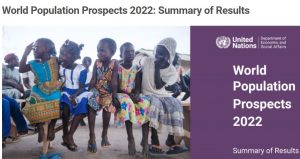World population hits eight billion
The global population is projected to reach eight billion this month and it will peak at 104 billion in the 2080s, according to a new report from the United Nations.
The World Population Prospects 2022 report also projects that India will surpass China as the world’s most populous country in 202.
The report says the global population is growing at its slowest rate since 1950, having fallen under one per cent in 2020.
It says the world’s population could grow to around 8.5 billion in 2030 and 9.7 billion in 2050. It is projected to reach a peak of around 10.4 billion people during the 2080s and to remain at that level until 2130.
The report found that fertility rates have fallen markedly in recent decades for many countries.
Currently, two-thirds of the global population lives in a country or area where lifetime fertility is below 2.1 births per woman, roughly the level required for zero growth in the long run for a population with low mortality.
 The populations of 61 countries or areas are projected to decrease by one per cent or more between 2022 and 2050, owing to sustained low levels of fertility and, in some cases, elevated rates of emigration.
The populations of 61 countries or areas are projected to decrease by one per cent or more between 2022 and 2050, owing to sustained low levels of fertility and, in some cases, elevated rates of emigration.
More than half of the projected increase in the global population up to 2050 will be concentrated in eight countries: the Democratic Republic of the Congo, Egypt, Ethiopia, India, Nigeria, Pakistan, the Philippines and the United Republic of Tanzania.
And countries in sub-Saharan Africa are expected to contribute more than half of the increase anticipated through 2050.
The report says rapid population growth makes eradicating poverty, combatting hunger and malnutrition, and increasing the coverage of health and education systems more difficult.
And that conversely, achieving the Sustainable Development Goals, especially those related to health, education and gender equality, will contribute to reducing fertility levels and slowing global population growth.
In most countries of sub-Saharan Africa, as well as in parts of Asia and Latin America and the Caribbean, the share of population at working age (between 25 and 64 years) has been increasing thanks to recent reductions in fertility.
And the report says this shift in the age distribution provides an opportunity for accelerated economic growth per capita.
“To maximize the potential benefits of a favourable age distribution, countries should invest in the further development of their human capital by ensuring access to health care and quality education at all ages and by promoting opportunities for productive employment and decent work,” the report says.
The share of global population at ages 65 and above is projected to rise from ten per cent in 2022 to 16 per cent in 2050.
At that point, it is expected that the number of persons aged 65 years or over worldwide will be more than twice the number of children under age 5 and about the same as the number under age 12.
The report says countries with ageing populations should take steps to adapt public programs to the growing numbers of older persons, including by establishing universal health care and long-term care systems and by improving the sustainability of social security and pension systems.
“Global life expectancy at birth reached 72.8 years in 2019, an improvement of almost nine years since 1990. Further reductions in mortality are projected to result in an average global longevity of around 77.2 years in 2050. Yet in 2021, life expectancy for the least developed countries lagged seven years behind the global average,” the report says.
The COVID-19 pandemic has affected all three components of population change, it says.
Global life expectancy at birth fell to 71.0 years in 2021. In some countries, successive waves of the pandemic may have produced short-term reductions in numbers of pregnancies and births, while for many other countries, there is little evidence of an impact on fertility levels or trends.
The pandemic severely restricted all forms of human mobility, including international migration, the report says.
See the full report here: World Population Prospects 2022: Summary of Results | Population Division (un.org)












